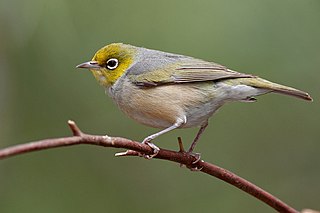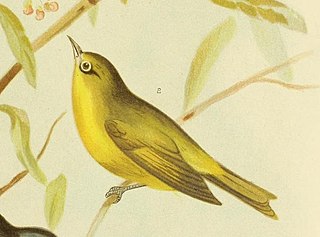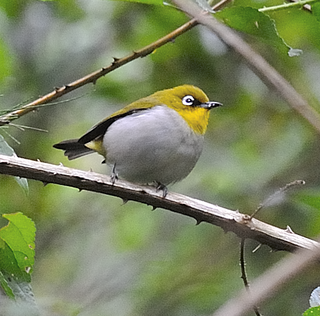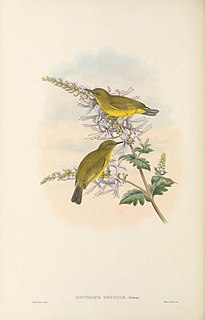
Zosterops is a genus of passerine birds containing the typical white-eyes in the white-eye family Zosteropidae. The genus has the largest number of species in the white-eye family. They occur in the Afrotropical, Indomalayan, and Australasian realms. Typical white-eyes have a length of between 8 and 15 cm. Their most characteristic feature is a conspicuous white feather ring around the eye, though some species lack it. The species in this group vary in the structural adaptations of the tongue. The Zosterops [griseotinctus] group is an example of a "great speciator" inhabiting a vast area and showing a remarkable morphological differentiation on islands, some of which maybe as close as 2 km (1.2 mi) apart.

The silvereye or wax-eye is a very small omnivorous passerine bird of the south-west Pacific. In Australia and New Zealand its common name is sometimes white-eye, but this name is more commonly used to refer to all members of the genus Zosterops, or the entire family Zosteropidae.

The Indian white-eye, formerly the Oriental white-eye, is a small passerine bird in the white-eye family. It is a resident breeder in open woodland on the Indian subcontinent. They forage in small groups, feeding on nectar and small insects. They are easily identified by the distinctive white eye-ring and overall yellowish upperparts. The range previously extended eastwards to Southeast Asia, Indonesia and Malaysia but when the taxa in these regions were assigned to other species, the English name was changed.

The warbling white-eye, also known as the Japanese white-eye and mountain white-eye, is a small passerine bird in the white-eye family. The specific epithet is occasionally written japonica, but this is incorrect due to the gender of the genus. Its native range includes much of East Asia, including the Russian Far East, Japan, Indonesia, Korea, and the Philippines. It has been intentionally introduced to other parts of the world as a pet and as pest control, with mixed results. As one of the native species of the Japanese islands, it has been depicted in Japanese art on numerous occasions, and historically was kept as a cage bird.

Tetepare Island is the largest uninhabited island in the South Pacific, located at 8.716667°S 157.55°E. It is a part of Western Province of the Solomon Islands. It covers approximately 118 square kilometres. Tetepare supports pristine lowland rainforest and a rich inshore marine area. Tetepare Island is identified as an area with high biodiversity and conservation values.

The Vanuatu white-eye or yellow-fronted white-eye is a small passerine bird belonging to the genus Zosterops in the white-eye family Zosteropidae. It is endemic to Vanuatu, where it is one of the most common birds.

The lemon-bellied white-eye is a species of bird in the family Zosteropidae. It is endemic to Indonesia, where it occurs on a number of islands from the Sunda Strait to the Aru Islands. It is present on several of the Lesser Sunda Islands as well as on parts of Sulawesi, as well as many smaller islands, but is absent from the larger islands of Borneo, Java, Sumatra and Timor. Currently, HBW describes five sub-species of lemon-bellied white-eye. However, the extensive distribution of Z. c. intermedius is likely to contain more than one reproductively isolated population.

The Solomons white-eye or New Georgia white-eye is a species of bird in the family Zosteropidae. It is endemic to the New Georgia Islands in the Solomon Islands. It is also known as Zosterops rendovae but this name properly refers to the grey-throated white-eye.

The canary white-eye or yellow white-eye is a species of white-eye endemic to northern Australia in subtropical or tropical mangrove forests. Its common name reflects the circle of white feathers around its eye.

The Malagasy white-eye is a species of bird in the white-eye family, Zosteropidae. Found in the Comoros, Madagascar, Mayotte, and Seychelles, its natural habitats are subtropical or tropical dry forests, subtropical or tropical moist lowland forests, subtropical or tropical mangrove forests, and subtropical or tropical moist montane forests.

The yellow-throated white-eye is a species of bird in the family Zosteropidae. It is found in the Solomon Islands archipelago.
The Kolombangara white-eye or hermit white-eye is a species of bird in the family Zosteropidae. It is endemic to the Solomon Islands.

The grey-throated white-eye is a species of bird. Its family, the Zosteropidae, is probably not valid and belongs in the Timaliidae instead. It is also known as Zosterops ugiensis because Z. rendovae has often been used for the Solomons white-eye.
The Rennell white-eye or the bare-ringed white-eye, is a species of bird in the family Zosteropidae. It is endemic to Rennell Island in the Solomon Islands. Its natural habitat is subtropical or tropical moist lowland forests.

The northern yellow white-eye, formerly the African yellow white-eye, is a species of bird in the family Zosteropidae. It is found across sub-Saharan Africa, from Senegal in the west across to southern Sudan in the east and south to northern Angola.
The Ranongga white-eye or splendid white-eye is a species of bird in the family Zosteropidae. It is endemic to the Solomon Islands.
The Vella Lavella white-eye, belted white-eye, or banded white-eye is a species of bird in the family Zosteropidae. It is endemic to the Solomon Islands.

The Togian white-eye is a species of bird in the family Zosteropidae.
The Vanikoro white-eye is a species of bird in the family Zosteropidae. It is endemic to Vanikoro in the Santa Cruz Islands of Temotu Province in the south-east of the Solomon Islands chain. The species is named for David Gibbs, who discovered it.

Swinhoe's white-eye is a bird species in the family Zosteropidae. It is found in east China, north Vietnam, the Thai-Malay Peninsula, Sumatra and Borneo.














